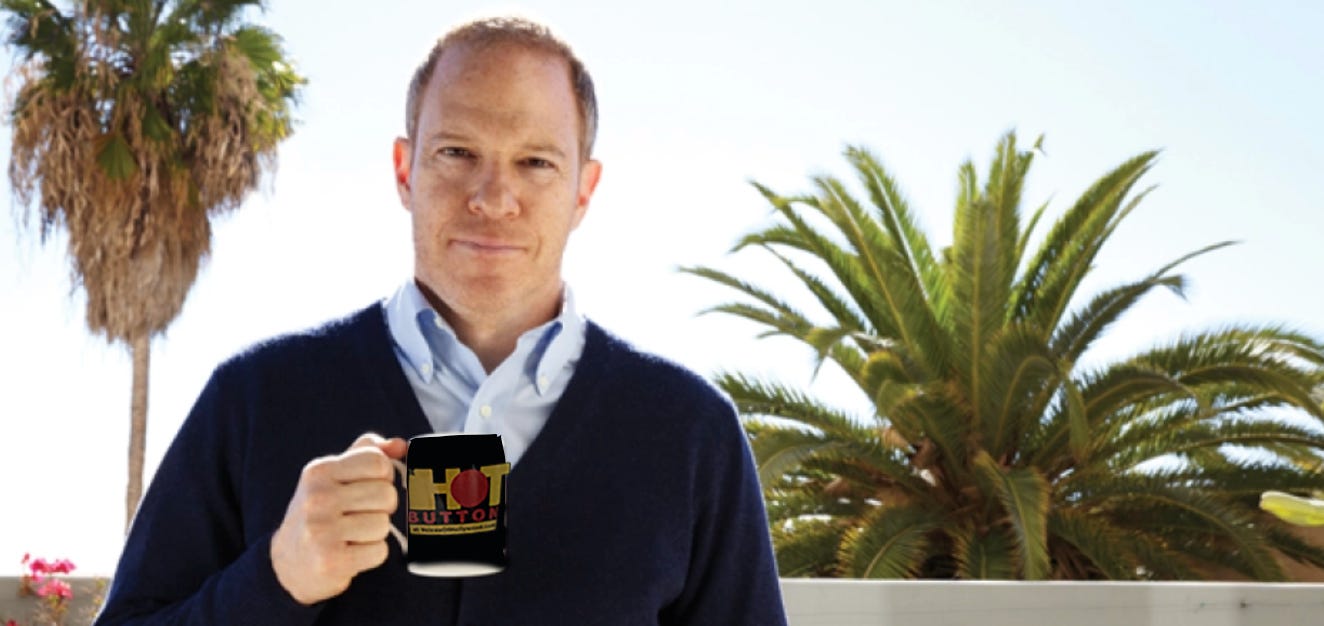I feel like we are in a moment where the opinion-driven journalists are in a tizzy, with their same old scripts aren’t feeling so safe. I mean, deciding whose butt will be available to kiss by the end of this year is getting harder and harder.
So I thought I would actually just chew on some facts today. (I know this is where some of you move on to that Kardashian podcast. It’s ok. I feel your pain. Try living with all this stuff in our head.) And the fact base that has been most avoided in favor of whim this last week, with the arrival of Time Warner Discovery (it’s a retail store… it’s a streamer… it’s got debt!), is the Warners history of Toby Emmerich.
And I gotta tell you… it is a more complicated process to analyze than you might expect.
Toby has been in the driver’s seat for Warner’s movie division since 2017. As you know, we had a bit of a pandemic anomaly and a wild-eyed charmer in Jason Kilar from March 2020 - March 2022. So I went back to 2017/2018/2019 to try to figure out how great or not Mr Emmerich has been in the chair.
Of course, there are a lot of giant variables landing on the desk where the buck stops, many of which very few of us have any knowledge of at all. History is not just gossip over lunch at The Grill. But…
I looked at the 57 titles released doemstically and abroad by Warner Bros in those years, $14.4 billion in grosses.
I know… 2.4 billion in annual returns is just chicken feed in the world of streaming. Ha ha ha. Silly little theatrical. Over 3 years, that’s only 20% of the debt load of TWD that everyone is sweating over. Nothing! Throw it back!
Anyway…
There are a hundred ways of breaking down this list of titles. For instance, 26 of the 57 could qualify as “films no one makes anymore.” That list might be led by Dunkirk, followed by A Star Is Born, then Crazy Rich Asians. That trio grossed $1.19 billion worldwide.
To be fair, the other 23 films I might catagorize onto this list - without those big hits - grossed $1.2 billion. That alone makes them about 14% of the revenue for the period. And none of those titles were huge investments and at least 3/4 of the titles were profitable.
That is how an eco-system works. In all endeavors, everyone seeks the 3 movies at the top of this list. Some want to believe that they can be selectively made without the other 23 films, which are just modestly profitable (a few hundred million $s a year… who needs that?!?!). But there is no history suggesting that this is the fact… for any producer… anywhere… in history. What we do see is that a producer, like Kevin Feige or David Heyman, can connect to a content brand that is both built by the producer and embodies something bigger than the producer and produce 90%+ winners over a run of years.
That is a fantastic future. But it is not a future you can plan on.
The irony is that people who argue the Muffin Top theory of show business almost all also revere Netflix… which operates mostly on the Muffin Bottom theory of content… which is to say, make a ton of muffins and pack them in and the Muffin Tops will show themselves. Somehow, this works for Netflix and all other streamers in the minds of these opiners… but not for theatrical.
But I digress…
The top category for WB movies is DC franchise films, with 7 in those 3 years, grossing $4.4 billion worldwide.
The next group is Other Franchise Films, led by Fantastic Beasts, the 2 Legendary Kong/Godzilla films, 2 Lego movies, Paddington 2, Blade Runner 2049, Tomb Raider, and Doctor Sleep. $2.7 billion.
Group 3 is Horror, where Warners had 6 titles that grossed $2.19 billion.
Some would say that “anyone” could do this part of it. I would say that they are being too dismissive of how wrong this process can go and often has gone.
That said, how does this top slice of WB films compare to other studios?
Well, Universal seemed the most apt company to compare them too, given that Disney is so narrowly focused now. And as is inevitable, comparisons get a little tricky.
My top category for Universal would be their Big Franchise titles. They don’t have a DC or Marvel. But in those 3 years, with 1 Jurassic title, 1 F&F, 1 Despicable Me, and 1 F&F Presents, they did $4.34 billion, matching what Warners did with 7 DC titles.
Number 2 were Other Franchises for Universal, grabbing $2.04 billion with just 6 titles, all reboots or sequels.
Number 3 for Universal is Horror, where they managed $1.9 billion with 10 titles, less than Warners did with 6.
And a close #4 for U is Animation, which could be #1 if you chose to move Despicable 3 into that category instead of Big Franchise. But I don’t in this case… $1.67 billion.
Add Skyscraper, which is a kind of outlier for Universal, before you get to their list of 21 movies they made that “no one makes anymore” and the $2.5 billion that those films grossed would make that the #2 revenue category, but doesn’t here because it took so many titles to get there.
But those “who’d make that today?” titles from 2017-2019 include 1917, Green Book, Girls Trip, Yesterday, Last Christmas, Good Boys, First Man, Blockers, and Cats, all of which, for better or worse, are sticky titles in the cable/streaming world.
Would they have been as sticky, while cheap and profitable, without a theatrical release? Magic 8 Ball says, “No f-ing way.” And apparently, Universal agrees, pretty solidly in the 45-day-theatrical-window camp. (Adjustments to come over time, based on data.)
But back to the Warner Bros… I’ve only addressed 22 of their titles in those 3 years so far. Categorizing them gets complicated. For instance, I led this piece with “films no one makes anymore.” But I really wouldn’t include Dunkirk because of Nolan or A Star is Born because of Gaga and Cooper. They fit… but they were made, clearly, for reasons other than their screenplays first.
I actually have 5 different break-outs for Emmerich’s 2017-2019 after the Top 3 that I detailed… starting with the hardcore “films no one makes anymore.” They are 23 titles with a cumulative gross is $1.4 billion. And that includes Crazy Rich Asians and Smallfoot, the only $200m+ titles on that list for Warners.
The Other Groups:
Big Budget Originals: Ready Player One, The Meg, and Dunkirk grossed $1.6 billion, each in profit. Only one of which is likely to sequalize.
Library Reboots: A Star Is Born, Ocean’s 8, CHiPS, Shaft, Going in Style: $855 million
Pop Culture Relaunches: King Arthur: Legend of the Sword and Pokémon: Detective Pikachu: $571 million
Original Action: Rampage and Geostorm: $649 million
Those last 3 categories… over $2 billion in grosses.
So, my conclusion about Toby Emmerich?
Much to my surprise, an objective look at his “the buck stop here” numbers for the studio, 3 years pre-COVID, are significantly better than I expected.
I would find a way to take away Toby’s greenlight for dramas. And comedies aren’t really his thing either.
But as a steward of “Boy Movies,” he is clearly comfortable and the studio has been successful with him leading the way. He has shepperded the franchise content that has been made about as well as one could ask. The results of Aquaman, Joker, and Wonder Woman are a step up from where they were.
Now… WW 1984 is a terrible movie. Shazam! underperformed and Emmerich has still moved forward with the sequel. Rumors around the next round of DC titles are brutal.
Fantastic Beasts 3 will depend on international for real success, as the others did. We are about to find out.
And the 13 titles 2017-2019 that flopped (did under $50m worldwide ) are almost all dramas and comedies. Like I just wrote… not his strength. But they should not be abandoned or thrown to streaming only. Zaslav should hire someone who knows how to do that well, because it takes an eco-system.
There is the urge to dive into 2020-2021, but that isn’t really fair to Emmerich. His greenlight was clearly curtailed under Kilar and the release of the films was skewed by Project Popcorn, the little engine that couldn’t. There are no straight comedies and the dramas were reduced to King Richard and the Sopranos prequel.
I am sure you are bored of hearing it from me, but the theory that business can continue for “only the big movies” doesn’t take into account that someone needs to pay for the brick and mortar theaters where those big movies gross so much. It was the expansion of the screen count and a system that allows big openers to be on 15,000+ actual screens on opening weekend that makes for mega-openings. If all there are is big movies, there won’t be 15,000 screens to show any movie on and the price of tickets will be driven up a lot, again shoving customers away from theaters out of short-sighted hysteria, and drastically lowering the grosses for those big movies too.
But that isn’t what the newsletter is about today. It’s about Toby.
He is not a leader of singular vision. One can’t really say, “Oh… that is a Warners movie or a Toby Emmerich kind of title.” But he keeps the trains running. The studio is in desperate need of someone with a better sense of comedy and drama. That emphasis will be rewarded if they do get one.
As much as my instinct for years has been to focus on Emmerich as a clever survivor, that assessment has been too harsh. Unless Zaslav has a specific focus for the future of WB film, there is no real demand for him to make a change in this job… except to bring in that strong 2nd who can really control the comedy and drama output. (Have I repeated that enough times yet?)
It’s funny how facts can change your perspective on something you really thought you knew. Wonder if journalists covering this business could apply such a concept. Hmmm.
Until tomorrow…















Share this post